Interview with Syfy's President Dave Howe
Maj Canton - January 6, 2010
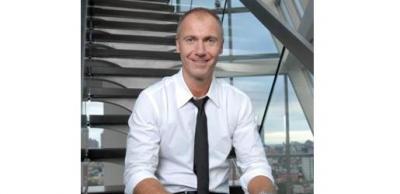
Just before Christmas, TV Tango took part in a conference call with Syfy President Dave Howe. He answered questions about and touched on a number of topics, including network rebranding, Saturday night TV movies, a spectacular Ghost Hunters special in 2010, and many many programs in development.
 |
Question: Now that you changed the title of the network, can you talk about how the brand has already made significant changes in programming?
Dave Howe: In terms of programming I think, as I said six months ago, a lot of this predated the brand evolution launch. The last three to five years have really kind of driven a strategy to drive new eyeballs to the network, to bring in more younger viewers, more gender balanced set of viewers. To take our viewers more upscale and to create a range of content that's going to appeal to everyone. |
Not necessarily everyone all the time, but at some point on our schedule there will be something that works for you, that says to you this is not a channel that is not for me that is kind of narrow and just about space opera. This is a channel that's speculative, that's imaginative, that does shows that are unique, that are different out there. And I think what you'll see in 2010 in our programming -- and to some extent actually I think Caprica epitomizes that -- you're going to see shows that people don't expect from us, shows that, yes, tackle speculative subject matter but tackle it in a way that is very accessible and relatable. Characters that you recognize, that you can relate to, shows that have a sense of humor that have a warmth and an optimism as well as thought-provoking kind of veneer to them as well. And I'm more excited now by our development than I've ever been. I think (Mark Stern) and his development team have done an amazing job pushing the envelope, pushing the boundaries and basically doing what we've all tasked ourselves to do which is to imagine greater around the kind of shows that we've been doing in the past and will be doing in the future. |
|
|
|
 |
Q: Syfy recently launched Outer Space Astronauts. I wanted to know what was behind the decision to get into comedy and will the network add more comedies?
DH: Well this isn't the first kind of comedic show that we've done. I think several years ago we had a show on there called Tripping the Rift which was a 3D animation which was a kind of satirical look at all things sci fi fantasy which actually did very well for us. |
But the problem when we launched Tripping the Rift -- I think four or five years ago we didn't have an audience base that could sustain a show like Tripping the Rift on its own. I think we didn't really have a major 18-34 demo coming to the network regularly. I don't think people anticipated or expected comedy from us. And I think we wanted to do Outer Space Astronauts to send out that message about the brand evolution, that this isn't what you would expect from Syfy. You know, it's kind of a smart sophisticated -- almost kind of Office in space kind of show. And it's something that we really wanted to experiment with and take a risk with and I think you'll see more shows in 2010 that if you ask me directly do I think it's going to be a breakout hit? Chances are I won't know; none of us will know. But I think it's in our interest to push the button and see what works and what doesn't work and learn from that and apply it to our future development. |
|
|
|
 |
Q: Can you talk about Stephen King's the Colorado Kid? Well you guys renamed it the Haven. But what can fans expect from that?
DH: I think we're very excited about Haven. We've always wanted to work with Stephen King on a series. You know, his miniseries that we have in our library have always done well for us. He's obviously a flagship name in the business. |
| And I think the opportunity around Haven is very significant. I think it's a very cool concept. I think it's very relevant to today. I think the characters and the situation -- I've only read one script, the pilot script -- it's very impressive. I think it has all of the attributes that we want in any series, it has characters that you can relate to, it's set in the here and now. It has an underlying mystique and intrigue and suspense. And it tackles subjects which I think are going to be pretty diverse on a week to week basis. I mean it has a lot of elements that we're really excited about. |
|
|
|
| Q: How does the Syfy Channel scout new talent in terms of writers or programming? |
|
| DH: I think we, like most networks, (Mark Stern) and his development team in LA are always looking at who's out there. We're always learning from other people's projects. There's been an explosion of competitive scripted shows, in particular across cable. They're taking pictures all the time, they have meetings with the agents in LA all the time. It's always in our interest to be at the forefront of discovering new talent and that's part of (Mark) and his team's remit in terms of finding the next huge writer, the next huge show runner, the next big visionary. |
|
|
|
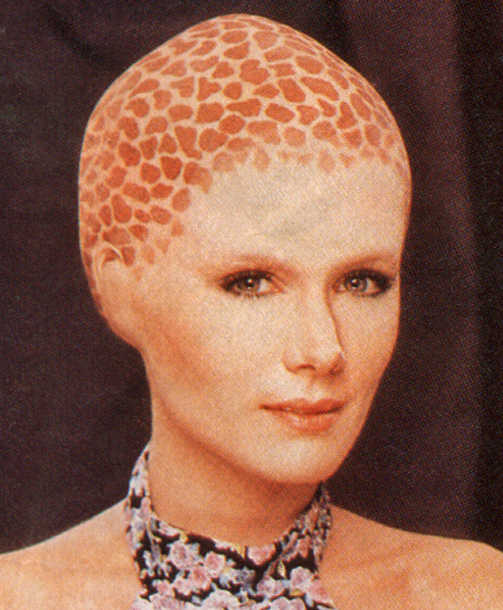 |
Q: I had a question about - actually two projects that had been previously announced but I hadn't heard anything about for a while. And the first was Alien Nation and whether or not that was still in the works and going to come to the network.
And then as a second part of the question was a while back - I guess it's a couple years ago - the deal with Virgin Comics was announced and the Stranded TV series. And I know they had their mergers and whatever with Liquid Comics. I was wondering if anything survived from that and if we might see any efforts into comics or into adapting TV series that you guys work on comics with the creators? |
| DH: They're both very valid questions and both projects still exist. They're both still in development. I think this speaks to the thing that always surprises people is how long it takes to develop shows. Alien Nation is very much still in development. I get an update on where we are every week. Usually it's kind of back and forth in terms of the writers, the outlines, the various kind of scripted durations. And the same with Stranded, these are both active viable projects. I'm not expecting them on our air in 2010 or even 2011 necessarily. I think they all join the mix of green light material that we read and we figure out as we move ahead. But they're both interesting and exciting projects. As for Liquid Comics, Virgin Comics as it was, which gave birth to Stranded, I'm still in active conversation with Sharad Devarajan who's the CEO of Liquid Comics. We don't have another joint venture deal with them but we're both very excited to do one again in the future. It was a really interesting exercise for us. We've got a number of projects out of it. And this is a very kind of a smart, creative, strategic company that we want to work with again in the future. I think now we're out of 2009 and moving into 2010 and budgetarily things are going to pick up and we can afford to invest in a few more interesting partnerships and projects. I think Liquid Comics is possibly one that will come back. |
|
|
|
 |
Q: Can you give us the return dates or at least approximate return dates for Eureka and Warehouse 13?
DH: I don't actually have the accurate dates. We tend not to set them as we get closer. But I can tell you that almost certainly they'll both be back in July. Which particular week or which particular day in July I don't know at this point but almost certainly July. But they'll definitely be back in the summer. |
| The tap dance that goes on most networks between the end of the year and the beginning of the summer is - it's the usual budgeting stuff. And the week you air a network has material in perhaps on your annual budget and you tend to do that tap dance in the first couple months of the year and things settle down and then you can actually announce the real date. |
|
|
|
|
Q: A few years ago we talked a bit about the video game industry and Syfy's desire to break into that. What ever happened with that? |
|
| DH: Well we're still actively involved in video gaming. It's still a primary driver of our business development team. You know, we have a new head of Syfy ventures, (Alan Siefert) who joined us in May from CNBC who's absolutely at the forefront of spearheading new joint ventures and partnerships with companies going forward. But our flagship partnership with Trion Worldwide is moving ahead at a pace. We announced I think over a year ago now a joint venture with Trion to co-develop and co-launch a subscription MMOG game and a weekly scripted series. And, you know, we're actively developing that. We have a joint development team from (Mark Stern)'s area and the Trion team. We're at that kind of pilot stage on the series. We have a working title for the series, it's called One Earth. And you're going to be hearing more over the coming weeks and months about that joint venture. Trion launches the first channel of its new gaming platform in the summer I believe it is. And they're first game is going to be called Heroes. Excuse me - Heroes of Telara. Yes please. Heroes of Telara which if any of you were at E3 last year you will see in the press it was - Heroes of Telara was called the potential successor to World of Warcraft which is the world's biggest MMOG - the world's biggest and most commercially successful MMOG. But the intention of our joint venture with Trion is to try to achieve that - the One Earth which creates a unique 24-hour immersive game and accompanying TV series that enables you to kind of see the characters and the situation, the environment in the game in a TV series. So we're very, very involved in video gaming. |
|
|
|
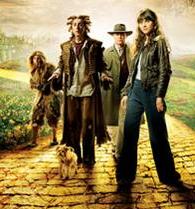 |
Q: A lot of people complain about Syfy's penchant for re-imagining everything under the sun. How do you respond to critics?
DH: We don't re-imagine that many things. I think we've done the Wizard of Oz, Alice in Wonderland and Battlestar Galactica. |
I think the thing that drives us in some of this is we recognize there's a whole new generation of consumers out there that have never heard of a lot of these projects, didn't see the original, are very open to the concept and an execution that's much more relevant and young and contemporary than the previous iteration. And I think it's a legitimate thing to attempt. We apply stringent criteria to these things. Unless it's a fresh take we don't bother. I mean if you look at Tin Man which was our version of the Wizard of Oz, you know, it's fundamentally different to the original movie and that makes it a complementary experience as opposed to trying to replicate or outdo the original. And the same, you know, with Alice in Wonderland, it's very much a let's start again and figure out a whole new storyline for Alice in Wonderland. We do it where it makes sense. And if it looks like a retread we're really not that interested. But if you look at 90%, 95%, 98% of our content, it is driven by unique originals that are not retreads. It's driven by Warehouse 13 and Eureka and Caprica and Ghost Hunters and all of those shows that have been successful for us that are unique and exclusively ours. |
|
|
|
 |
Q: After the rebranding, are there any minuses that you look back on and say well it was worth giving that up? Is there anything that you feel you gave up with the old spelling?
DH: No, actually. There are regrets is the answer to that which sounds like a pass-on but this was probably the most difficult and risky decision that any network undertakes. |
This was not entered into lightly. This was two years in the making and quite frankly the eight years I've been at Syfy. And actually if you talk to (Tom Battaglia) who is one of our longest serving team members who's been at Syfy for the full 17 years, this has been an annual debate, do we change the name of the network. I happen to have been very (anterior) as the head of marketing and then the general manager but I think it reached the point where we couldn't not change the name for all the reasons that we extolled at the time and continue to extol. We had no choice in the multiplatform, nonlinear, international global world, the streaming downloading world; we had to have a unique brand identity identifier name, call it what you like, that differentiated us from everybody else. Do I think we lost anything by losing it Sifi? No because I think we were - I think we were smart and strategic about trying to ensure that we kept the best of what we had and we used it as a bridge to something that we didn't have. So it's still recognizably about the genre. We're still absolutely about the genre.There's just something that creates a unique spelling and a unique identifier around that genre. So that's hopefully what we've achieved. And we've seen the best six month's ratings in the 17 year history of the network. |
|
|
|
 |
Q: Last time we spoke - this was like six months ago for the rebranding - you mentioned that your creative team was looking for foreign new space opera. And you wanted to find a Syfy Firefly, I believe you said, and take part of a genre and reinvent it in a way just for you guys.
Where you with that right now? Have you found a script yet? Have you found a creative team that you're invested in? |
|
DH: No we haven't. I mean we have a short list of projects that are in early development. We haven't made any decisions around any of those. But we're still actively pursuing it and if you know of anything feel free to let us know.
But we do have three titles that we haven't yet announced that at some point in 2010 we'll announce at least one or two of them. |
|
|
|
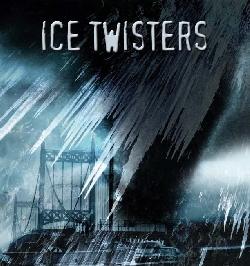 |
Q: The Saturday night TV movies have done very, very well for you guys, Malibu Shark Attack and Ice Twisters. My site has a huge audience for these films. Can you tell me some of the new titles that may be coming up the Saturday night movie franchise?
DH: Funny enough I have a list in front of me actually which I wasn't expecting that question. But we love these movies, too. And we have a lot of fun with these movies as you can imagine. And I know I may have said it on these calls before but I'll say it again, a lot of these movies start with the title. |
|
And somebody in one of these big crazy brainstorming meetings will throw out a (monster arc) and it'll become a movie or a (Mansquito) or a Sharktopus which I think may well be one of the names, I'm not sure whether we've announced that. |
|
|
|
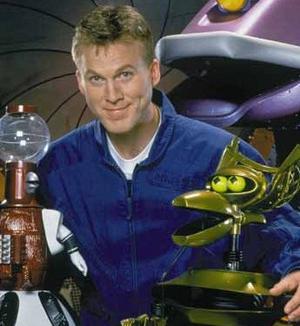 |
Q: One quick question too about Saturday movies. Has there ever been a thought about maybe bringing back Mystery Science Theater 3000 and just marrying the two together?
DH: I think I brought Mystery Science Theater up. I mean it's been a while actually since anybody - I used to get it all the time about MST3K because quite frankly that was the only thing people ever associated with the network. And they're those people that don't watch who still think we've got MST3K on our - clearly we haven't the eight years I've been here. |
|
We don't have any plans to bring it back. We've talked about it in the past but not for four or five years. I think the thing about MST3K is - and I'll ask you the same question as I say to everybody else is did you actually watch more than about 15 or 20 minutes? It's one of those kind of one-note amusing things which I'm not sure is sustainable for any length of time or any period of time. |
|
|
|
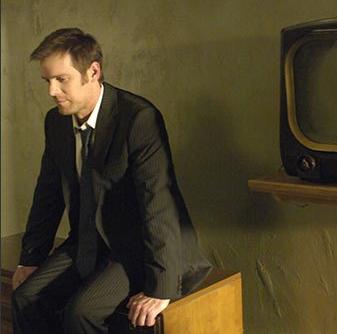 |
Q: The way The Lost Room ended, it seemed like there was talk about a TV spinoff. Whatever happened to that?
DH: That's a very good question actually because I haven't heard anything about The Lost Room for a while. I know we tried to develop it as a series but I think we struggled to close the deal on it. |
|
Let me just - I'm just flicking through the development report now. Yeah, I don't think it's in development. No it's not. I think it was a concept. It's interesting actually. It was a concept that we really loved. And if I'm honest I think we've done it better in Warehouse 13. If you look at the concept of Warehouse 13 which is objects with special powers I think Warehouse 13 does a does a better version of The Lost Room from a series perspective. |
|
|
|
 |
Q: Are there any special quote/unquote stunt episodes coming up for series like Ghost Hunters and Warehouse 13? DH: Yes there's - Sallie's looking at me horrified. I'm not going to blab this out but I have to say we do have an amazing announcement around Ghost Hunters - a Ghost Hunters special event in 2010 which blew us all away when we found out. This is an amazing - it's going to be an amazing event. |
|
And then we do have a whole host of initiatives, stunt casting initiatives that (Mark Stern) and his team have been doing with Warehouse and Eureka and all of our shows. You know, we actively try and cross fertilize and cross promote shows but they have a few ideas in terms of talking storylines around shows as well as characters which are very exciting. |
|
